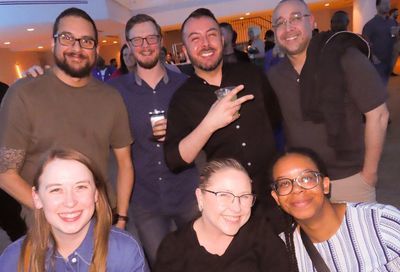4th Circuit panel dismisses lawsuit over North Carolina magistrate recusal bill
Appeals court finds plaintiffs must have suffered some form of injury to challenge law

A three-judge panel from the 4th U.S. Circuit Court of Appeals has upheld a lower court ruling finding that the plaintiffs mounting a lawsuit against North Carolina’s magistrate recusal bill do not have standing to challenge the law.
The law, known as SB 2, was passed in 2015 by the North Carolina legislature, which overrode the veto of Gov. Pat McCrory. SB 2 was proposed in response to the legalization of marriage equality in the state, which prompted social conservatives to clamor for special religious exemptions.
Under the previous law, any magistrate that refused “to discharge any of the duties of his office,” including solemnizing recently legalized same-sex marriages, could be removed from office and face misdemeanor charges.
Under the bill, any magistrate or register of deeds has the right to declare a “sincerely held religious objection” to solemnizing certain marriages, without fear of removal from office or legal charges. If they exercise that objection, they recuse themselves from solemnizing any marriage for a period of six months. If all officials in a particular county recuse themselves, the state would arrange for the transportation of a willing magistrate from another county to conduct marriages.
The law also contains a provision that any magistrate who resigned over same-sex marriage and was subsequently rehired within 90 days of SB 2’s implementation would receive full retirement service credit for the gap in service.
Three married and engaged same-sex couples sued over the implementation of SB 2, but in doing so, did not claim that the state had impeded their right to get married. Rather, they claimed that the law violates the Establishment Clause by authorizing the spending of taxpayer dollars in aid of religion.
Specifically, the plaintiffs challenged the spending of public funds to transport magistrates from Rutherford County to McDowell County, where all available magistrates had recused themselves over personal objections to same-sex marriages. They also objected to the state making a one-time payment into the state retirement system on behalf of reappointed magistrates who had quit their posts rather than marry same-sex couples.
According to the 4th Circuit panel’s ruling: “In light of the Supreme Court’s admonitions on the narrow scope of taxpayer standing, we affirm the judgment of the district court that plaintiffs lack standing to press this claim.”
In finding the plaintiffs did not have standing to sue, the court relied on rationale that was used by the Supreme Court to dismiss the standing of social conservatives who had attempted to defend California’s Proposition 8 — which banned same-sex marriage — after state officials refused to defend the law against lawsuits brought by LGBTQ rights groups.
“Article III of the Constitution limits the federal judicial power to the resolution of ‘Cases’ or ‘Controversies.’ An essential element of this bedrock principle is that any party who invokes the court’s authority must establish standing,” Judge J. Harvie Wilkinson wrote in the unanimous opinion. “To demonstrate standing, a plaintiff must prove that he has suffered a ‘concrete and particularized’ injury that is ‘fairly traceable to the challenged conduct of the defendant’ and is likely to be redressed by a favorable judicial decision.
“In other words, a party’s ‘keen interest in the issue’ is insufficient by itself to meet Article III’s requirements,” Wilkinson continued, citing the Hollingsworth v. Perry case that overturned Proposition 8. “‘Concerned bystanders’ may not marshal the judiciary as a ‘vehicle for the vindication of value interests’ — the exercise of judicial power is restricted to litigants who seek to rectify a personal and discrete harm.”
In layman’s terms, the court is essentially arguing that the plaintiffs’ case might be stronger if the lawsuit were brought by plaintiffs (preferably from McDowell County) who claim to have been inconvenienced or discriminated against because of SB 2, and were impeded from obtaining a marriage license in their place of residence.
Nonetheless, Luke Largess, the lead counsel for the plaintiffs, said his legal team was reviewing the court’s opinion and would make a future decision about pursuing future appeals by asking for a review of the case by the full 4th Circuit or appealing the decision directly to the Supreme Court.
The Campaign for Southern Equality, which has been supporting the lawsuit against SB 2, issued a statement calling the law “unjust” and saying it “distorts the true meaning of religious freedom.”
“From day one, it’s been clear that SB 2 is about one thing — finding a new way to discriminate against same-sex couples and privileging one set of religious beliefs over others,” Rev Jasmine Beach-Ferrara, the executive director of the Campaign for Southern Equality, said in a statement. “We will keep standing up to discrimination until LGBTQ North Carolinians are equal in every sphere of life.”
Support Metro Weekly’s Journalism
These are challenging times for news organizations. And yet it’s crucial we stay active and provide vital resources and information to both our local readers and the world. So won’t you please take a moment and consider supporting Metro Weekly with a membership? For as little as $5 a month, you can help ensure Metro Weekly magazine and MetroWeekly.com remain free, viable resources as we provide the best, most diverse, culturally-resonant LGBTQ coverage in both the D.C. region and around the world. Memberships come with exclusive perks and discounts, your own personal digital delivery of each week’s magazine (and an archive), access to our Member's Lounge when it launches this fall, and exclusive members-only items like Metro Weekly Membership Mugs and Tote Bags! Check out all our membership levels here and please join us today!























You must be logged in to post a comment.